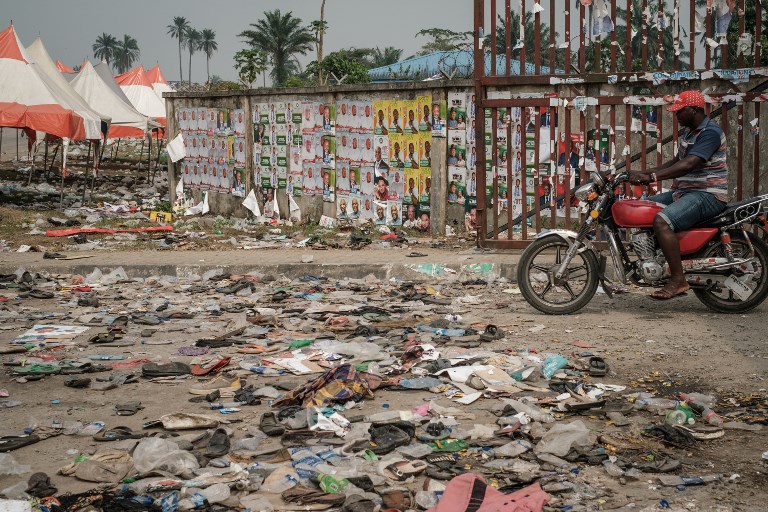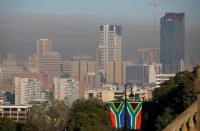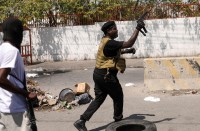
by Joel Olatunde AGOI
Agence France Presse
PORT HARCOURT, Nigeria (AFP) — Fifteen people were killed in a stampede at an election campaign rally by President Muhammadu Buhari in southern Nigeria, health officials said Wednesday.
In a separate incident on the campaign trial, jihadists in the northeast of the country attacked a convoy carrying a powerful state governor, killing four people.
The deaths are the latest to overshadow Saturday’s elections, in which Buhari is seeking a second, four-year term of office.
Kem-Daniel Elebiga, spokesman for the University of Port Harcourt Teaching Hospital, said “a total of 15 bodies were brought in” on Tuesday.
Three were men and the rest women, he added.
Twelve injured people were also brought in, nine of whom remained in hospital Wednesday. “They are all responding well to treatment,” said Elebiga.
Police in Rivers state, of which Port Harcourt is the capital, earlier gave a toll of four dead and four injured, while Buhari’s office said only that “several” people lost their lives.
Conflicting death tolls are not unusual in Nigeria, although the authorities often provide lower numbers.
Local media and eyewitnesses said the stampede happened when panic broke out at the end of a rally held in the city’s Adokiye Amiesimaka Stadium.
Crowds tried to force their way through a locked exit.
“Those from behind were pushing and putting pressure on those in front, leading to some persons falling on the ground and being trampled upon,” said journalist Egufe Yafugborhi, of the Vanguard newspaper.
Bloody aftermath
Blood-stained clothes, discarded shoes, and belongings remained strewn at the site Wednesday.
Eyewitness Catherine Omokiniovo told AFP: “I was outside the gate selling popcorn when people started coming out.
“All of a sudden we started hearing cries of those who had fallen and could not get up because they had been trapped. There was confusion everywhere.
“Over 20 bodies were taken away in ambulances,” she said, adding one of the victims was a pregnant woman and another a woman whose wedding was just months away.
Other witnesses gave a similar account. “The police blocked a section of the entrance with their vehicles, preventing free flow of movement after the rally,” said one.
In Rivers, police spokesman Nnamdi Omoni said an investigation has been opened to determine the cause of the stampede.
“We are also evolving measures to improve on crowd control at such events,” he added.
Crowd safety has been a concern at campaign rallies, with fanatical party supporters typically held back by inadequate fencing and ill-equipped security officials.
Last Thursday, two people were reported to have died during a crush at a Buhari rally in the northeastern state of Taraba.
On January 21, several people were injured in the northeastern city of Maiduguri when a platform collapsed during a visit by Buhari.
Rivers, home to the oil and gas industry, is a key battleground in the election between the ruling All Progressives Congress and the main opposition Peoples Democratic Party.
Election turbulence
Tensions typically mount between supporters of the two sides before, during, and after elections in Nigeria. Already, there are claims of attempts to rig the vote.
Five APC members were shot and killed Sunday during weekend clashes with PDP followers near the oil city of Warri, in Delta state.
In northeastern Nigeria, meanwhile, two soldiers and two civilians were killed late Tuesday when Boko Haram ambushed a convoy carrying Kashim Shettima, governor of Borno state, security sources said.
The attack took place near the town of Dikwa, in area notorious for attacks by a Boko Haram faction loyal to long-time leader Abubakar Shekau.
Shettima, who is stepping down as governor after a maximum of two four-year terms, has been campaigning for a seat in the Senate, for which elections also take place on Saturday.
The assailants also seized people who were aboard a bus in the convoy that got stuck in the sand and could not flee, according to a member of the Civilian Joint Task Force, a militia formed to help fight the jihadists.
© Agence France-Presse







